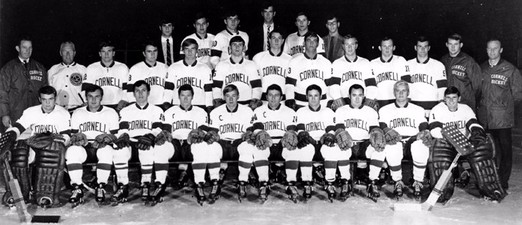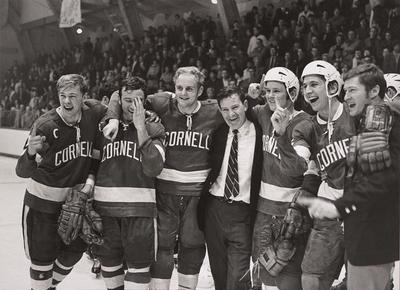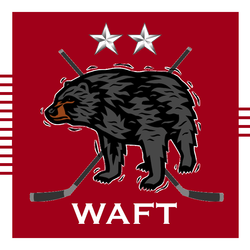"The dedication, team goals set and met, teamwork, motivation, desire to win...seemed to be natural to us," summarized Bertrand. Unchecked ambition and unbounded desire drove the legends of the 1969-70 team to brave the impossible. Ardor distinguished this team from perhaps all other hockey teams in the history of the game.
"[C]aring and support for one another, just seemed to be natural to all of us...Coach Ned Harkness was the master at molding us together, teaching us to excel beyond expectation, and by instilling pride, desire, character, hard work, fear of failing and humility in us." A galvanized unity and unbreakable fraternity, forged by Harkness and undiluted by time, connects these near-mythic figures.
Many members of that team, after having reached a zenith of hockey, chose to use their talents in endeavors other than hockey. "[A]ll 23 players and our managers are still alive after 45 years since graduation, and have done well in contributing to society with their Cornell degrees." The community of Cornell University relishes its most successful student-athletes being among its best student-athletes.
The spirit of that team was harnessed individualism for an unselfish whole. In keeping with that spirit, this writer will do his best to attempt to give context to the contributions during the immortal season of the 16 players and three managers who will participate in the ceremonial puck-drop for the second annual Racker Big Red Rivals game on July 11, 2015 at 7:00 pm. Attendees will understand better the role of each as a result.
Each player and manager was not only important, but essential, to ultimate success. For those who enviously experienced this miracle, consider the tales of these greats as fond reminiscence. For the generations who lived those moments only through scattered photographs, stories, and video footage, consider these tales as a means of making real the too easily presupposed legacy and retrieving inspiring specifics from the reductionism that too often accompanies greatness.
One thing is certain. No matter your era, as Lynah Faithful, they are our team.
Bob Aitchison '71, forward, #8
Ed Ambis '72, forward, #17
Dick Bertrand '70, forward, #19
Craig Brush '72, forward, #11
Mark Davis '72, forward, #3
Bill Duthie '71, forward, #16
Larry Fullan '72, forward, #18
Steve Giuliani '70, defenseman, #15
John Hughes '70, forward, #21
Dan Lodboa '70, defenseman, #14
Brian McCutcheon '71, forward, #9
Ian Orr '70, defenseman, #22
Bill Perras '71, forward, #5
Garth Ryan '70, forward, #6
Doug Stewart '72, forward, #10
Dave Westner '72, forward, #20
Management
Alf Ekman and Doc Kavanaugh were the trainers who tended to the needs of the 1969-70 team. The latter warranted praise no less than "the number one trainer in the universe." The managers who served the team were Rick Fullan, Ken Gilstein, Steve Gorkin, Monica Perry, Artie Roth, and Mike Teeter.
Mike Teeter served as an equipment manager during road contests. The team kept him busy in his other capacity at home as well. Teeter moonlighted as a goal judge. His legend as a dedicated and passionate member of Cornell hockey and athletics for more than 40 years deservedly precedes him.
One knows the importance of a figure when those who know her well insist upon prefixing her name with "great." Monica Perry, or "the great Monica Perry," helped Cornell hockey teams for years in whatever ways that she could. Perry was undeterred to do the required from the practical to the theatrical. Her role was no different, but arguably more important, when Cornell completed perfection.
Rick Fullan '70 enjoyed an eccentric relationship with Cornell hockey during the 1969-70 season. Fullan was a member of the junior-varsity hockey team. This did not prevent him from serving in a role as a capable assistant and manager to the team. The injuries of Steve Guiliani '70 and Ron Simpson '72 complicated Fullan's role. Ned Harkness called up one of his team managers from the junior-varsity roster to serve as a defenseman if needed. Rick Fullan was ready to play if required. The need never presented itself. Fullan's willingness manifested a yeomanly impulse toward his team. There was no doubt that Rick Fullan contributed considerably to the success of the 1969-70 team.
Possible, but unlikely, attendees
Brian Cropper rose to be the starting goaltender of his squad. He had a large role to fill, figuratively and literally. Cropper stood to 5'6". His superlative predecessor, Ken Dryden '69, towered nine inches higher. The junior netminder made considerable strides in the off-season and Ned Harkness knew that he would be the best netminder in the East when the season began. Brian Cropper was slightly less reserved in his style than was Dryden. Proneness to instinctual athleticism typified his style. He proved more than able to duel with one of the nation's best goaltenders in Wisconsin's Wayne Thomas in the national semifinal in Lake Placid. The results cannot be doubted. Brian Cropper led his team unblemished through his season.
Bob Rule was a borrowed lacrosse goaltender. He led Cornell lacrosse to is first NCAA title a year after serving as Cropper's 1969-70 back-up. Ned Harkness insisted as the season began that he never would hesitate to use Rule. Rule was a "very valuable asset." The junior backstop saw action in three contests during the perfect season. Bob Rule did not allow a goal in contests at Penn and against Dartmouth. The latter contest saw Rule ward off an angered fury of eight Big-Green shots. Harkness tested the waters late in the season to see if Rule could be trusted with playoff minutes. Only one contest in which Rule saw ice time did he give his head coach reason for any doubt.
One of the core members of the 1969-70 hockey team's defensive corps will not be at the event in Ithaca. Gordie Lowe paired with Dan Lodboa '70. Lowe is most remembered for the overtime winner that he rifled into Michigan Tech's net in the 1969 Frozen Four in Duluth. That goal sent his Cornell team to the national-title game. However, Gordie Lowe played a slightly modified role in winning a national-title game one year later. The senior blue liner battled back from sprained ligaments in two weeks to return to the line-up. His defensive presence was a constant. While Lodboa began to dazzle, Lowe embodied steadiness. The 1970 NCAA Championship Final enjoyed Gordie Lowe's soundest defensive game of his career. In two very distinct ways, separated by a year's time, Gordie Lowe lifted his team to the highest level of the college game.
Ron Simpson '72, praised as "the best sophomore defenseman" whom Harkness had coached in his then-21-year career, paired with Steve Giuliani '70. Simpson was the impenetrable dam that kept at bay even the most torrential of flooding from opponents's offensive outbursts. Then, injury struck. The sophomore blueliner elected for immediate surgery and rehabilitation. He did not expect to return that season. He returned less than nine weeks later.
Injuries along the blue line forced bold players to fill voids at crucial points in the season. Few injuries could be as devastating to the nation's best defensive corps than were the losses of Gordie Lowe and Ron Simpson. It is unusual that at various points, the same player filled in for either player. Jim Higgs, a sophomore newcomer to the 1969-70 team, was the player whom Harkness trusted. Higgs performed with little drop-off until Gordie and the "sensational sophomore" returned.
The player with the fieriest disposition was without any doubt Kevin Pettit '71. Pettit riled his team for critical contests and all rivalry clashes. He inspired the ire or awe of all Eastern college-hockey fans. A game with this hot-tempered goal scorer was never mundane. Only John Hughes '70 and Dan Lodboa recorded more points in the 1970 postseason than did Pettit. Kevin Pettit tore through the 1970 ECAC Hockey Tournament with six points in three games. Fond memories of his overtime- and championship-winning goals against Boston University and Harvard from 1969 probably danced through his head as he buried the Red's first goal against its Crimson-colored rival in the 1970 Eastern semifinals.
Glancing around the rink lent itself to feeling the purity of the moment. The rink remained uncommercialized. Divining the essence of sport, its sincerity and reward of hard work, required no considerable imagination when envisioning carnelian and white racing down the ice. The jubilation that followed immortalized icons of the sport who completed the unthinkable.
Saturday, July 11, 2015, Lynah Rink
Sincerest thanks and profound gratitude are owed to Dick Bertrand, John Hughes, and Garth Ryan, without whom, this piece would not be possible. Thank you for your help, and for all that you have done for Cornell hockey and Cornell University.





 RSS Feed
RSS Feed
